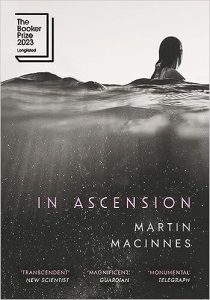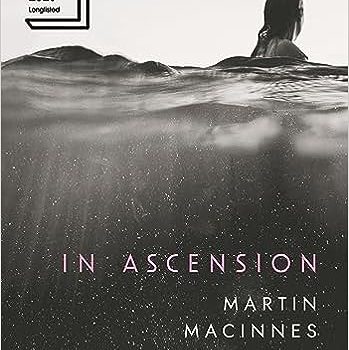Niall Harrison Reviews In Ascension by Martin MacInnes
 In Ascension, Martin MacInnes (Atlantic 978-1-83895-624-0, 496pp, £16.99, hc) February 2023. Cover by Carmen R. Balit.
In Ascension, Martin MacInnes (Atlantic 978-1-83895-624-0, 496pp, £16.99, hc) February 2023. Cover by Carmen R. Balit.
Towards the end of Martin MacInnes’s cerebral third novel, Helena Hasenbosch recalls a moment shared with her older sister Leigh, when they were children. It’s the end of a long summer day, and Helena is sent to call Leigh home for dinner. Leigh doesn’t want to go, and “gently, softly,” she grabs Helena and lifts her off the ground. “The moment stretches on, three, four seconds in suspension.” Helena becomes scared: she can’t breathe, fearful of what her sister is going to do. “They are spiralling away together, into a different reality. And then it stops.” It is the only incident Helena can remember in which Leigh took advantage of her firstborn status and greater physical stature in that way. In fact, for much of their lives, Helena feels that she has been the grown-up in their relationship, a grounded counterpoint to Leigh’s solipsistic intellectual fascinations. It is, for instance, Helena who, much later in their lives, arranges for the care of their ailing mother, Fenna, while Leigh has locked herself away on a top-secret research project.
Yet it is Leigh who is the primary narrator of In Ascension, and the projects she is involved in that occupy most of its page count. In the early part of the novel, when Leigh is in the final year of her doctorate in marine biology, she takes a position on a commercial expedition prospecting the Atlantic seafloor; it discovers an anomaly that appears to go deeper than the Mariana Trench. Later, Leigh’s work investigating algal crops as a potential food source leads to the top-secret project mentioned above, a position with the multilateral Institute for Coordinated Research in Space that is planning long-term space missions to exploit a breakthrough in propulsion technology. Still later, she becomes a crew member for a specific mission. Throughout all of it the demands of her family relationships are a constant thrum distracting from the science-fictional excitements. “Every time I tried to push my past into insignificance I only committed to it further,” she laments. MacInnes expertly manages the resulting tension between the intimate and the abstract, making In Ascension an uneasy read even when it seems to be at its most straightforward.
That tension, in fact, might be read as an attempt to reconcile two venerable SF traditions. In her analytical detachment, Leigh is a more than somewhat Ballardian protagonist. Her inner space is one of the novel’s important territories, and her work on microbial life becomes an obsessional gravity well around which her consciousness circles. Yet the final mission she undertakes is explicitly Clarkean, a voyage to the very edge of the solar system and to contact with the unknown, related with a sincere belief in both the technical and the cosmological. Discussing neurological experiments on humans that induce feelings of transcendence, Leigh insists that they represent “a cheat code for God,” and are therefore meaningless; her colleague, who is a believer, disagrees. “It’s an artificial route to the transcendent, but it doesn’t undermine it,” he argues. “The state attained remains meaningful.” It serves as a comment on the whole novel.
What finally elevates In Ascension, however, and I think likely makes it one of the best science fiction novels of the year, is how deftly these concerns are embedded in a ruthlessly contemporary depiction of an international, ecological near future. The first chapter is a meditation on the work of Leigh and Helena’s father, Geert, a hydraulic engineer maintaining the Netherlands’ polders. We are told how Rotterdam’s skyline has come to resemble that of Manhattan, “a forest of steel, chrome and glass,” but also how contingent its existence is on Geert’s continued work. Unfortunately, in the twenty-first century it is no longer predictable work, and this intolerable fact drives Geert to dark places. So another tension, between capitalist development and environmental management, is there from the start, and as the narrative elaborates, it becomes another complicating background hum. It’s there in the sponsorship of Leigh’s oceanic exploration, in the design of the spaceship she ultimately helps to create, in the protests against that mission by environmental activists, in Helena’s later life in Indonesia. The novel as a whole embodies the principle that it isn’t just our personal history that locks us into spiralling feedback loops: our planetary history does too, and awareness of this is part of what makes daily living in the Anthropocene feel, you might say, so very strange. “It’s perhaps difficult,” one character says to Leigh at one point, “to really face this [embedded strangeness]; certainly it’s difficult to do the idea justice.” I agree with them. But the steely unity of In Ascension, as it traverses from the hadalpelagic zone to the heliopause, makes it a compelling attempt.
In Niall Harrison’s spare time, he writes reviews and essays about sf. He is a former editor of Vector (2006-2010) and Strange Horizons (2010-2017), as well as a former Arthur C. Clarke Award judge and various other things.
This review and more like it in the August 2023 issue of Locus.
 While you are here, please take a moment to support Locus with a one-time or recurring donation. We rely on reader donations to keep the magazine and site going, and would like to keep the site paywall free, but WE NEED YOUR FINANCIAL SUPPORT to continue quality coverage of the science fiction and fantasy field.
While you are here, please take a moment to support Locus with a one-time or recurring donation. We rely on reader donations to keep the magazine and site going, and would like to keep the site paywall free, but WE NEED YOUR FINANCIAL SUPPORT to continue quality coverage of the science fiction and fantasy field.
©Locus Magazine. Copyrighted material may not be republished without permission of LSFF.






